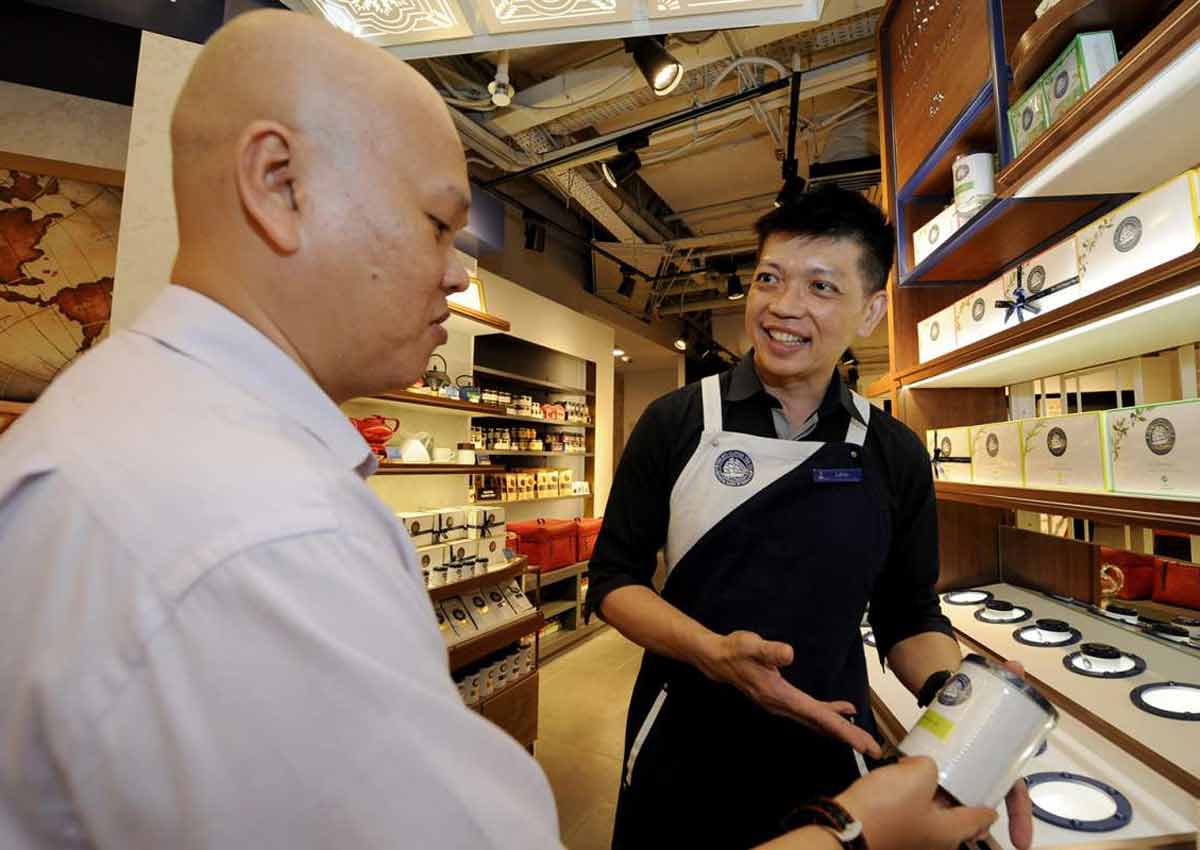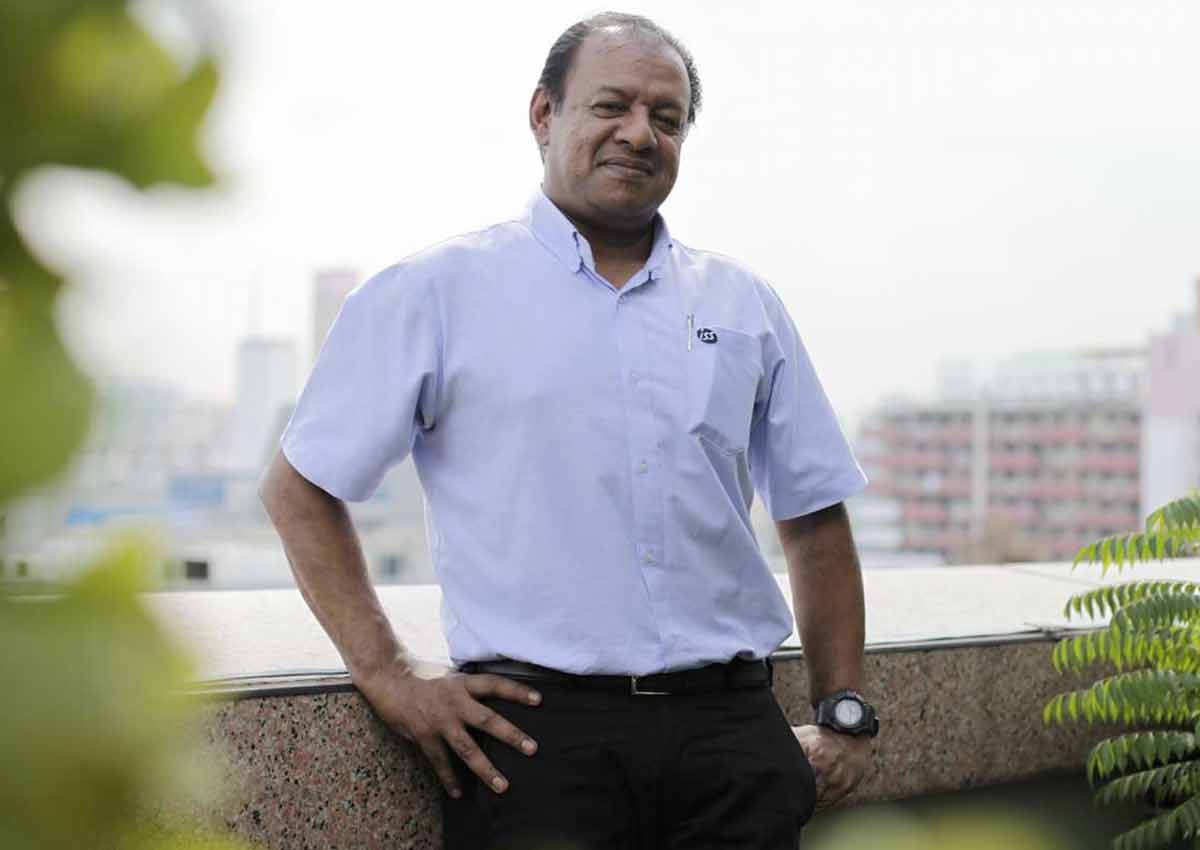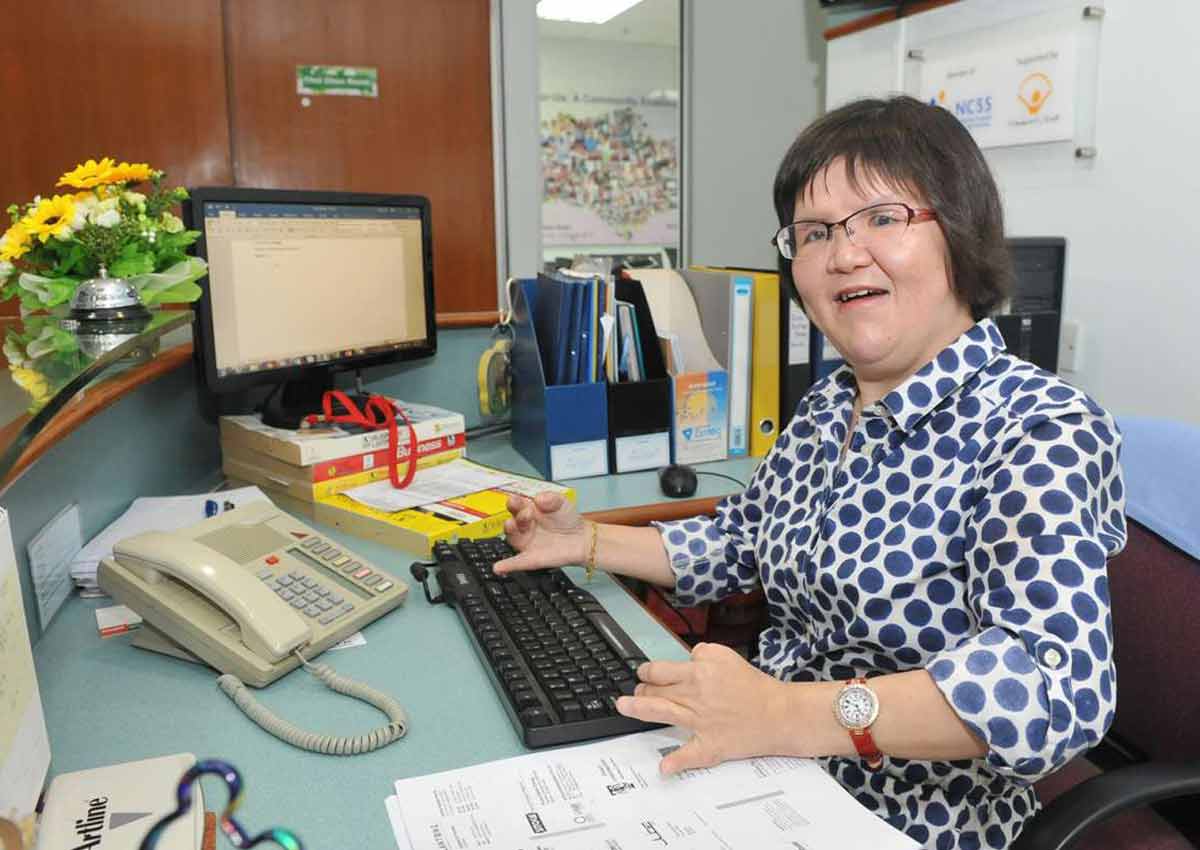A video of a woman lashing out at a disabled cleaner has gone viral. Sunday Life talks to cleaners and disabled workers about the treatment they receive from customers
If you have visited the 12,000 sq ft premises occupied by non-profit organisation Bizlink in recent years, chances are you would have met Ms Ng Hwee Sze.
The bubbly 36-year-old is cheekily referred to by her colleagues as the unofficial “face of Bizlink”, given that her role as the front-desk recep- tionist means she is the first point of contact for anyone calling or visiting the premises.
Bizlink provides job employment and assessment services for people with disabilities.
Ms Ng has Apert syndrome, a genetic disorder that causes the premature fusion of certain bones in the skull as well as fingers and toes, for which she has had 13 operations.
But no matter her physical handicap, her bosses say she does her job with pride, just like the growing number of Singaporeans with special needs who hold front-end positions that require frequent interaction with members of the public.
From retail staff to customer service crew to baristas, Singapore employers – including the local arm of global conglomerates such as Starbucks, KFC and Uniqlo – are hiring people with disabilities. Government agency SG Enable was also set up in July 2013 to enhance employability and employment options for those with special needs.
But despite the positive policy and prescriptive changes, it seems the mindset of the Singaporean public still has some catching up to do.
Just a week ago, a video, showing a woman giving a deaf and mute foodcourt cleaner a tongue-lashing for clearing her food prematurely, went viral.
Related: Woman apologises for scolding deaf-mute cleaner
In a survey released last month by Singapore philanthropic house Lien Foundation, findings suggest that Singaporeans are tolerant towards, rather than accepting of, those with special needs – with 64 per cent of the more than 1,000 people polled saying they believe Singaporeans are willing to share public spaces but not interact with the special needs community.
And a survey of 1,000 people with disabilities, released earlier this month by the National Council of Social Service, found that 62 per cent do not feel they are included, accepted, given opportunities to contribute or reach their potential by society.
For special needs people such as Ms Ng, it seems that proving they can do their job well despite their handicap is yet another challenge they have to face.
Ms Ng, who graduated from Ngee Ann Polytechnic with a diploma in accountancy in 2006, recalls a particularly painful instance when she was badly scolded by a client because a Bizlink employee whom the client had gone down multiple times to meet with, was not around.
The daughter of a company director and a housewife says: “When she was shouting at me, I felt very helpless, but I could do nothing other than to apologise. I was made to feel as though I hadn’t done my job because of my handicap, even though I had passed on her messages as asked.”
Read also: Verbally abused deaf-mute cleaner intends to quit

Leroy Lee (right), who has partial visual impairment, works as a retail sales associate where he introduces tea brands to customers.
Others like Mr Leroy Lee, a visually impaired retail promoter at 1872 Clipper Tea Co. at Tangs, say dealing with impatient Singaporeans is part and parcel of their customer-facing roles. He suffers from glaucoma, and relies only on faint vision in his left eye after becoming completely blind in his right eye 10 years ago.
“I have definitely dealt with one or two impatient customers in my work,” the 52-year-old says. “On my part, I have to find ways and processes to overcome my disability so I can do my best to help my customers.”
This latent discrimination is perhaps why many special needs staff choose not to wear badges or tags that identify them as having a disability.
Ms Jacelyn Lim, deputy executive director and head of the Employ- ability and Employment Centre at the Autism Resource Centre, says: “While the purpose of such identification is the hope that members of the public will treat the person with a disability with more patience, tolerance and kindness, there is also the possibility it may lead to them becoming a target to be taken advantage of.”
For 21-year-old Starbucks barista Ng Jian Yang, choosing to not wear a badge that identifies him as autistic is based on a decision to focus on his job instead of his special needs.
“If I encounter rude or impatient customers, I just focus on making their drink quickly and moving on to the next one,” he says.
Another autistic sales and customer service staff in her 20s, who declines to be named, adds that identification of disabilities can influence people’s perceptions of her. “Even if I wear a tag, people may still misunderstand me,” she says. “I would rather they not see my disability and focus on my abilities instead.”
Despite the challenge of dealing with unsympathetic members of the public, all the workers with disabilities interviewed for this report say their overall experiences in their front-end roles have been positive, bolstered in large part by encouraging co-workers and employers.
Deaf marketing executive Jorena Tan, 36, says her colleagues at public relations firm Affluence PR always prepare PowerPoint slides for their weekly office meetings so she can stay abreast of what is being discussed. They also learn sign language from her every Monday so they can communicate better with her.
Mr Lee says his customers help him read the small print on packaging labels if he has difficulty doing it himself.
And at the Braddell branch of KFC, deaf team member Wendy Wong, 46, has even had some regular customers learn basic gestures so they can indicate whether they want to eat their food at the restaurant or have it to go.
It is positive experiences like these that make special needs employees like Ms Ng not regret choosing jobs that involve so much interaction with members of the public.
“While I do hope that people can be nicer and more understanding towards those with disabilities, why should I be shy and work in a back-end job just because I have a handicap?” she says.
“I love meeting new people, which is why I hope to stay in my job for a long time. I am an extrovert, okay!” – Ankita Varma

‘We do the diry work for you’
In his first year working as a cleaner in a foodcourt 10 years ago, Mr Rick Lee, 48, accidentally knocked into a patron and splashed gravy from a bowl on the middle-aged man’s white shirt.
The patron was livid and shouted at Mr Lee: “This is branded, you know? I paid $200 for it. I was going to a nice dinner, but you dirtied my shirt. You have to pay for it.”
The stain was the size of a golf ball, and Mr Lee believed it would be removed after a wash. But the patron was insistent, so Mr Lee bought him a new shirt that cost about $50, took the dirty shirt off the man’s back and got it dry- cleaned by the next day.
Mr Lee and other cleaners tell The Sunday Times that they and their co-workers have encountered unreasonable behaviour from customers.
He says: “We have to ‘lower’ ourselves and apologise, even if it is not our fault. We have no choice. That’s the way it is in the service industry.”
The spotlight has been cast on the verbal abuse cleaners are sometimes subjected to, following an incident that happened about a week ago at Jem mall’s foodcourt. A deaf and mute cleaner, Mr Png Lye Heng, 64, was yelled at by a woman because he cleared her food before she had finished her meal.
A video, which later went viral, shows the woman lashing out at a manager of the company providing cleaning services to the foodcourt when he tried to explain that his worker was deaf and mute.
Operations manager Winson Soh of cleaning firm Horsburgh Engineering says confrontations between patrons in hawker centres or foodcourts and deaf cleaners are quite common.
He explains that while deaf cleaners have no speech impediments, they are used to communicating with grunts or by gesticulating.
“But the patrons cannot see anything wrong with them, so they get offended and wonder why the cleaner can’t just speak to them properly and ask to clear their food,” Mr Soh, 40, adds.
Some patrons then end up shouting at the cleaners in anger. Mr Soh says he watches such employees closely and intervenes quickly when a negative situation arises.
Able-bodied cleaners also get scolded for clearing patrons’ food when they are not done.
Mr Lee, now a cleaning supervisor employed by Sergent Services, says cleaners are instructed to clear food that is left unattended for 10 to 15 minutes. But some patrons leave their food at the table to buy drinks, which sometimes takes a while.
“They get angry when they return and find their food gone. Some demand that we replace the meal,” he says, adding that he has done so in the past.
Cleaners say they also often find themselves on the receiving end of unkind remarks and allegations.
Once, Mr Lee heard a woman telling her son when he was cleaning their table: “If you don’t work hard, you will end up like him.”
He was hurt, but let it slide. “I tell myself that I am earning an honest living. I am not begging or stealing,” he says.
When things go missing, however, cleaners say they are the first to be accused.
Mr Thomas Lee, 48, manager of cleaning firm Friendly Supplies, says: “The question, ‘Did you take my things?’, is offensive to my staff.”
Cleaning managers say the accusers usually do not apologise after the cleaner is found to be innocent.
The cleaners find different ways to deal with the challenges at work.
Madam Soh Ai Kim, 60, recounts that an office employee told her not to touch her bag when cleaning the area because her hands were not clean. “I was hurt, but I just wore a pair of gloves after that,” she says.
Those who are told that they have body odour try to change their uniforms multiple times a day.
Mr Mohamed Kahir, 52, who is now in a supervisory position with cleaning firm ISS Facility Services, says he simply nods quietly and smiles when the other party is being unpleasant or unreasonable.
“I try to be humble, and I never go into a direct challenge,” he says.
His positive attitude has paid off. He has won awards and certificates of commendation from customers. “I’m proud of the work I do,” he says.
“Cleaners are important to the society. We do the dirty work for you that you do not do yourself.” – Bryna Singh

This article was first published on June 12, 2016.
Get a copy of The Straits Times or go to straitstimes.com for more stories.



































